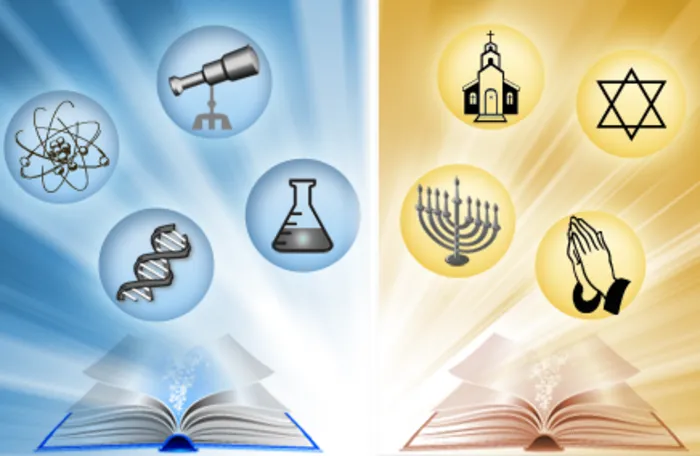Religiosity and science often seem to go in opposite directions. While religion seeks existential answers through faith, science seeks them through observation and experimentation.
Adverts
Faced with this dichotomy, the question arises: are they compatible or doomed to conflict? In this text, we will explore this issue, analyzing different points of view.
Is it possible to reconcile religious faith with the search for scientific knowledge? What are the limits and contributions of each field?
In the next sections, we will discuss the importance of dialogue between religion and science, their possible relationships of conflict or complementarity, the limits imposed on the search for truth, scientific contributions to the understanding of religiosity and the relevance of this debate in today's society.
Take part in this reflection and explore with us the fascinating relationship between religiosity and science: compatibility or conflict?
The importance of Dialogue between Religion and Science
The dialogue between religion and science transcends the apparent barriers between these two fields of knowledge, playing a crucial role in improving understanding and advancing human sapience.
While religion offers profound insights into spiritual and moral aspects of existence, science seeks to unlock the mysteries of the natural world through empirical methods.
By integrating these apparently contrasting approaches, space is opened for a more complete and enriching vision of reality. This integration not only allows for a more holistic understanding, but also promotes tolerance and mutual respect in pluralistic societies where diverse worldviews coexist.
Dialogue is not limited to mere peaceful coexistence; it is dynamic and provides surprising discoveries and insights. Scientists, when inspired by their religious beliefs, often explore new frontiers of research, elevating human knowledge to unexplored levels.
Simultaneously, this exchange challenges established religious interpretations, instigating an ongoing search for understanding and meaning. The importance of this dialogue transcends academic borders, reaching the cultural and social sphere.
It nurtures fertile ground for the harmonious coexistence of different perspectives, creating a solid foundation for an inclusive and tolerant society. Therefore, recognizing the essentiality of this dialogue is fundamental for intellectual progress and the construction of more understanding and interconnected communities.
A Relationship of Conflict or Complementarity?
The debate surrounding the relationship between religiosity and science has persisted over the centuries. While some claim that these spheres are incompatible and perpetually conflicting, others maintain that they can complement each other and coexist in harmony.
On the one hand, there are those who see religiosity and science as distinct systems of knowledge, each with their own approaches and methods. For these individuals, religion addresses spiritual and moral issues, while science seeks to explain the natural world through observation and experimentation.
On the other side, there are those who believe in the complementarity between religiosity and science, providing different perspectives on human existence and the universe.
For them, religion can provide answers to questions about the meaning of life and morality, while science can offer empirical explanations and evidence about the functioning of the natural world.
It is important to consider that the relationship between religiosity and science may vary depending on individual beliefs and interpretations. Furthermore, promoting an open and respectful dialogue between these two domains is crucial to seeking a broader understanding and enriching human knowledge.
The Limits of Religion and Science in the search for Truth
Despite the methodological differences and limits inherent to each domain, there are areas in which religion and science can converge and interact in fruitful ways. The mutual recognition of these points of convergence can further enrich the understanding of reality.
Religion, when dealing with existential and spiritual issues, often offers an ethical and moral framework that influences individual and collective decisions. This moral dimension is crucial for building a just and compassionate society.
On the other hand, science, by investigating natural phenomena and developing technologies, contributes to material progress and human well-being. By integrating these different dimensions, it is possible to achieve a more holistic understanding of the human condition.
Collaboration between religious adherents and scientists can result in innovative approaches to social, ethical and environmental challenges. The synthesis between fundamental ethical values and scientific advances can promote balanced and sustainable solutions to the complex problems we face.
Furthermore, promoting interdisciplinary dialogue between theologians, philosophers, scientists and ethicists can open new frontiers of understanding, transcending the limitations inherent to each discipline in isolation.
The encounter between spirituality and rationality can generate a synergy that not only enriches the search for truth, but also strengthens social ties by creating a common basis of respect and understanding.
Reciprocal Contributions
The relationship between religiosity and science has been the subject of discussion for centuries. While some argue that these two fields are incompatible and even conflicting, others argue that they can complement each other and offer a more comprehensive understanding of reality.
Science, through its rigorous methods and systematic investigation, has contributed to the understanding of religiosity in different ways.
Firstly, the scientific point of view has studied the psychological and social aspects of religion, exploring how it influences human behavior and social interactions.

Furthermore, science has investigated the biological bases of religiosity, examining how the human brain responds to religious experiences and the possible neurobiological mechanisms involved.
Another important contribution of science to understanding religiosity is the analysis of religious beliefs and practices from an anthropological perspective.
Comparative studies between different cultures have revealed similarities and differences in forms of religious expression, allowing a broader understanding of religious diversity.
In short, science plays a fundamental role in understanding religiosity, offering valuable insights into its psychological, social, biological and anthropological aspects.
By dialoguing with religion, science can enrich our understanding and promote a more informed and constructive debate on this complex and significant topic for today's society.
A Necessary Debate for Today’s Society
Furthermore, it is essential to highlight that understanding the coexistence between religiosity and science does not imply the dilution of their individual identities. Each of these spheres has its epistemological autonomy, maintaining its specific methodologies to explore distinct truths.
The recognition of this complementarity does not seek to homogenize, but rather to enrich the intellectual and cultural panorama. Within the framework of open and respectful dialogue, it is possible to foster an environment conducive to the constructive exchange of ideas.
Understanding that the differences between religion and science do not necessarily make them adversaries, but rather complementary ways of understanding the world, can lead to a deeper appreciation of the complexities of human existence.
Furthermore, this dialogue can catalyze collaborative efforts in areas where the ethical principles of religiosity and scientific discoveries converge.
Promoting harmonious coexistence, based on mutual acceptance and valuing the contributions of each domain, not only strengthens social ties, but also drives joint progress towards human well-being.
Ultimately, the peaceful coexistence of religiosity and science not only respects the diversity of perspectives, but also creates fertile ground for the joint search for truth.
By nurturing a deeper and more integrated understanding of these two spheres of knowledge, contemporary society can aspire to a future where diversity of beliefs and worldviews is celebrated as a catalyst for cultural and intellectual evolution.




